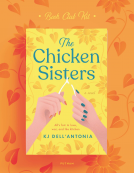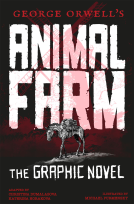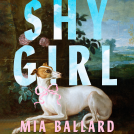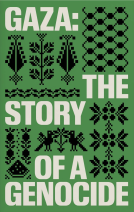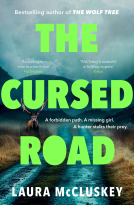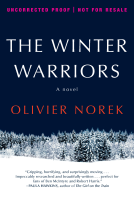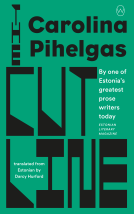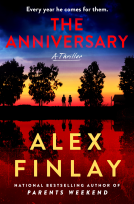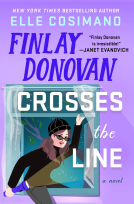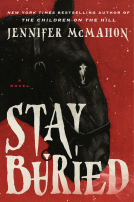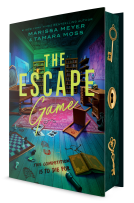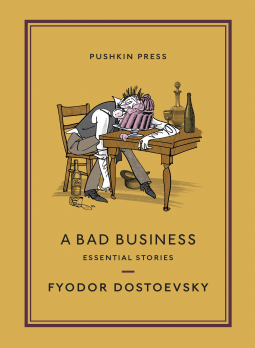
A Bad Business
Essential Stories
by Fyodor Dostoevsky
This title was previously available on NetGalley and is now archived.
Send NetGalley books directly to your Kindle or Kindle app
1
To read on a Kindle or Kindle app, please add kindle@netgalley.com as an approved email address to receive files in your Amazon account. Click here for step-by-step instructions.
2
Also find your Kindle email address within your Amazon account, and enter it here.
Pub Date Mar 29 2022 | Archive Date Feb 07 2022
Pushkin Press | Pushkin Collection
Talking about this book? Use #ABadBusiness #NetGalley. More hashtag tips!
Description
This vivid collection of new translations by Nicolas Pasternak Slater and Maya Slater illuminates Dostoevsky's dazzling versatility as a writer.
His remarkable short fiction swings from wickedly sharp humour to gripping psychological intensity, from cynical social mockery to moments of unexpected tenderness.
The stories in this collection range from impossible fantasy to scorching satire.
Advance Praise
"A sprightly new translation... reminds us how extremely funny [Dostoevsky] could be". --Times Literary Supplement
"A sprightly new translation... reminds us how extremely funny [Dostoevsky] could be". --Times Literary Supplement
Available Editions
| EDITION | Other Format |
| ISBN | 9781782276739 |
| PRICE | $18.00 (USD) |
| PAGES | 224 |
Average rating from 33 members
Featured Reviews
A Bad Business was a delightful and fascinating short story collection, not least because it showcased a different side to Dostoevsky than we see in his novels. There is still some psychological introspection here, but there is also humour and wit. 'The Crocodile' in particular kept me smiling from start to finish, and that was one of my favourite tales, along with 'The Meek One' and 'A Bad Business'. If you are already a fan of Dostoevsky, you will want to check out this collection. If you've wanted to read Dostoevsky but have worried the novels will be too heavy going, these short stories may offer a good place to start. The book gets five stars from me.
"A Bad Business" is a collection of Dostoevsky's most beloved short stories; ideal for readers that have yet to dip their toes into the genius that is Fyodor Dostoevsky's prose and stories.
These 6 new translations of Dostoevsky’s short writings were new to me, but gave me everything I would expect from this author. Some of the stories are longer than others, but they all pack a punch and are filled with the usual insightful characters and commentary on Russian society. Each one of these tales feels relevant today because Dostoevsky masterfully examines the human condition in everything. Some of these are funny, the title stories A Bad Business, Conversations in a Graveyard (Bobok), and Crocodile are silly fun, but of course are full of metaphor and meaning. A Meek Creature, The Heavenly Christmas Tree and the Peasant Marey show us the brutal side of Russian society, poverty, prison life, war. Doestoevsky perceptively writes from many points of view that is still relevant and relatable today. This was a really fun reading experience for me and I recommend.
This collection of six short stories shows the full range of Dostoyevsky’s themes from the satirical humour of The Crocodile to the sadness of The Heavenly Christmas Tree. A dark comedy about class in A Bad Business (also known as A Nasty Story). Bobok or Conversations in a Graveyard is about an author lingering in a graveyard overhearing the chatter of the recently dead. The sixth story is A Meek Creature (or A Gentle Spirit) about the suicide of a young bride. Her pawnbroker husband narrates the story, justifying all his own actions leading up to it. Such a great writer, I loved this book!
 Reviewer 247162
Reviewer 247162
This a very good collection for both those new to Dostoevsky and those well-versed as it provides some lesser known short stories. Pushkin Press is always an instant purchase for me and this is another fantastic edition to their line.
Classic stories, invariably loved. This is the first time I'm reading Dostoevsky stories, and I definitely want to explore more. Always a treat to read Pushkin titles!
 liana p, Reviewer
liana p, Reviewer
I really do adore Dostoevsky, I honestly, whole-heartedly do. He, alongside Dickens probably, are two authors that I don't reach for all that often, mostly because their works are both enormous and quite emotionally taxing, but I end up loving every single one I read. Same goes for this short story collection.
I really loved the fact that Dostoevsky could be a bit more experimental in this one, exploring themes - even moods - that he wouldn't usually depict in his books. The premise of the story where a man gets swallowed by a crocodile had me dying, but upon reading it, I think we can still see some more serious and socially aware themes throughout the story. The premise may seem funny, even silly, but the story is still a critique of contemporary society, and I also found it to be a very poignant depiction of toxic masculinity and male self-obsession. It was definitely my favourite story out of the book, and I'll probably go back to it again at some point.
I also really enjoyed the story about the writer in the cemetery. Once again, the premise reads like a very absurd sitcom (and I think it would make a great limited series to be honest), but it ends up being reflective and critical. It definitely left me wanting more, so I think this is another story I will be revisiting.
** An ARC was provided via Netgalley in exchange for an honest review. **
 Michael S, Reviewer
Michael S, Reviewer
A new translation of six stories by Fyodor Dostoevsky (four longish, two quite short) from late in his career. Several of the stories are quite clearly satirical, and even divorced of any cultural context were pretty funny. But I couldn't shake the impression that if I were living in St. Petersburg in 1876 they would have been <i>hilarious</i>. Worth reading to experience a more-lighthearted Dostoevsky than you might have expected, and probably very rewarding for someone with a great handle on Russian domestic politics in the 1870s.
 Calzean J, Reviewer
Calzean J, Reviewer
Dostoevsky certainly knew how to lampoon Russian middle and upper class society. I found these six stories a great mix of sad, satire, cynicism and comedy. I would never have thought he could write such a gem of The Crocodile. These are easy to read and an insightful view of Russia in the mid 1800s.
A Bad Business: Essential Stories – Fyodor Dostoevsky (translated from the Russian by Nicholas Pasternak Slater and Maya Slater)
A man eaten by a crocodile. A graveyard where the dead still bicker amongst themselves. An argument and uproar at a wedding. Do these premises sound like the work of Fyodor Dostoevsky?
I have to admit, I went into these stories more than a little apprehensively. My only experience of the author was “Crime and Punishment”, which I didn’t find enjoyable at all, so my expectation was endless moralising and torment of characters.
Much to my surprise and delight, this collection was nothing like that at all. Some of the stories do have the author’s notorious psychological intensity, but there are also moments of real humour and tenderness. Some of them haven’t aged well, in my opinion (not least the comedy German accents in The Crocodile), but others still got me to laughed out loud even today, not least Conversations in a Graveyard. There is tenderness found in The Heavenly Christmas Tree, and it was genuinely interesting to see the stylistic breadth that Dostoevsky put to paper in his lifetime.
However, the briefness of this review doesn’t come out of nowhere, and my biggest gripe with this book comes with the use of “essential”. These might be essential in forming a complete view of the Russian writer’s work and the bigger picture, but I’m not sure that they should be prioritized over his more famous works, hefty though they may be.
All in all, I would recommend this one to fans of 19th century literature, and anyone who wants to see a different side of a notoriously bleak author, but I’m not sure this should be your introduction to his work.
A thoroughly enjoyable, sharp collection that showcases some of Dostoevsky's shorts.
The wit and satire is evident throughout, which isn't something I would have expected not having read his work before, but which was a wonderful surprise.
 Georgina T, Reviewer
Georgina T, Reviewer
A collection of short stories which show the full range of human psyches and Dostoevsky's ability to get right inside them and create fantastic stories which allow such insight into their characters. Each story is so different and I enjoyed them all. There are moments of laugh out loud humour, cringeworthy embarrassment and incredible sadness. I will definitely be reading more of his work.
To be remembered for ages......................
A Bad Business by Fyodor Dostoevsky is a wonderful narration of human minds and relationships. Filled with humor and satire, the book is going to give you a deep insight into what people think about each other. Although, the book is translated but it did not lose its originality. Each and every makes a different imprint on your mind. An unforgettable book with some beautiful stories. I, not only enjoyed the book but loved it.
I would, definitely, give the book 5 stars. Thanks to Netgalley and Pushkin Press for providing me an opportunity to read and review the book.
 Reviewer 762493
Reviewer 762493
I don't know how it is, but I've never encountered anyone else quite as capable of rendering inner dialogue as vividly and realistically as Dostoevsky.
His characters have great opinions of themselves, some vague awareness of their defects, occasional embarrassment - they're dreamers exploring possibilities and imagining themselves loved and capable, but falling under self-delusion, correcting themselves again and again, trying to maintain their moral high ground even when they fall piteously.
This volume contains six stories.
"A Bad Business" is the tale of a general who believes himself to be a man of the people, a friend of the little man (he is, in fact, quite full of himself). But his good intentions fall short of realization, and instead of being beloved as a benefactor, he manages to destroy the wedding (and perhaps the life) of a poor man under his command. It's a wonderful story, containing so much tension between the desire to be someone and the actual results of one's actions; the quiet seething of people of lower classes who can't retaliate openly; the entitlement of the upper classes.
"Conversations in a Graveyard (Bobok)" is about a man, possibly mad, who falls asleep in a graveyard and hears the dead wake up and start talking about this and that - only superficial things. In fact, the main character remarks to himself that it's quite unexpected, where one can get their information on Russian society. It's fun, and funny.
"A Meek Creature" is a sad story about a forty year-old pawnbroker who marries a sixteen year-old woman and. For reasons he never understands, she kills herself. From the outside, one can speculate, but it's never resolved: she married him when constrained by poverty; he blew hot and cold; she may have perceived him as threatening; she might have felt guilt for a number of reasons. Who knows, who knows...
"The Crocodile" is a satire - a man gets swallowed whole by a crocodile, and this is now a potentially geopolitical event of great import. It might also affect the economy of Russia.
"The Heavenly Christmas Tree" is a story that reminds me of Hans Christian Andersen's "The Little Match Girl": a little boy whose mother dies runs out on Christmas and sees revelers, but is turned away from everywhere, finally dying of the cold.
"The Peasant Marey" is a short story about remembering a kind-hearted peasant from the author's autobiography. Not much happens, but it somehow manages to still be memorable.
 Robert S, Reviewer
Robert S, Reviewer
This is a new translation of 6 Dostoevsky short stories: all are very good and some are excellent and quite memorable. We see the author's dark sense of humor in some of the stories (my favorites) and his sentimental streak in others.
I can't speak for the translation, but the English reads naturally with no stilted affect.
Anything by Dostoevsky is worth reading, and this collection is no exception.
 Richard L, Reviewer
Richard L, Reviewer
Fyodor Mikhailovich Dostoevsky, sometimes transliterated as Dostoyevsky, was a Russian novelist, short story writer, essayist, and journalist.
A Bad Business is a new Pushkin collection of short stories; it is a very accessible and readable translation of his writing. A perfect opportunity to gain insight into Russia in the 19th Century while delighting at this author’s way with words. His wit, satire and love for his country, slowly finding it’s place in Europe.
As a teenager I quickly bought Crime and Punishment and The Brothers Karamazov as a sign of my literary credentials, sadly although I have read Solzhenitsyn to my shame I had not read Dostoyevsky until I had this wonderful chance to find the writer’s short stories in this particular collection.
Pushkin should be applauded in their approach to restoring into English so many worthy authors and through NetGalley making this title available as an ARC.
I have finally found this talented storyteller in my own reading experience and pleasure.
I now feel both confident and comfortable to tackle his novels. This will no longer be to flag up my literary status but a journey of love and appreciation.
 Mallika R, Reviewer
Mallika R, Reviewer
My thanks to Pushkin Press and NetGalley for a review copy of this book.
A Bad Business is a set of six short stories by Dostoevsky collected in this ‘Essential Stories’ volume by Pushkin Press. The first four are longer length, and more ‘substantial’ so to speak but all the stories are impactful in their own ways. We touch on different themes and genres—satire to fantasy, humour (the most unexpected for me) to poignancy.
The book opens with the titular tale, ‘A Bad Business’, in which a young and upcoming general Ivan Ilych Pralinsky, just after attending a small party thrown by his former superior and friend, chances upon the wedding of an office (and class) subordinate while walking home. He decides to attend and put to practice his theory of ‘humaneness’ (his word for being on an equal footing with class inferiors) which he had been arguing is just what society needs (although almost immediately after leaving the party, the first thing he has done is to contradict himself). But having already had a fair bit more to drink than he is accustomed to, and having to drink some more out of courtesy at the wedding, things begin to go wrong right from the start, and Pralinsky’s actions, while perhaps only bringing embarrassment to himself, turn the groom, Pseldonimov’s life quite upside down, possibly with lasting consequences. This story explores themes of aspiration/idealism versus practice, class, and also perhaps circumstances since a large part of what happens is because Pralinsky is unused to that much drink. But what really left an impression is how many layers Dostoevsky gives us in this story to explore and to think back over, from the basic story arc of what Pralinsky’s presence at the party does, to the different characters themselves (even guests at the party with smaller ‘roles’ so to speak give us much to think about), and the dynamics between them.
Next was a completely different one, ‘Conversations in a Graveyard’ where an author Ivan Ivanovich, whose original work has met with little success, and who writes advertisements, translates French works, and has written many letters to the editor, ends up spending the night at a graveyard. But no ordinary one, here the dead have conversations with each other, share stories or promise to. We meet a range of curious ‘dead’ people (‘ghosts’?), and equally curious narrator. This is one I think I’ll have to come back to, to get at its significance much more, such as the themes of earthly limitations and so on, no longer being applicable to these dead—be it ‘class’ or shame.
‘A Meek Creature’ gives us a typically complex Dostoevskian narrator. His wife has just committed suicide, which unsettles him (I didn’t want to think ‘obviously’ since this is Dostoevsky’s world, after all), and leads him to think back over all that has happened—from the moment he first came across her, a small, ‘meek’ creature who visits his pawn shop to becoming his wife and what unfolded thereafter. This was probably to me the most characteristically Dostoevskian tale, with plenty of revelations as we go along and a narrator whose motivations and attitudes, in fact his entire psyche, keep one thinking.
Then came the story that in a sense was my favourite in this collection, because of how different it was from his usual writings (or at least what one thinks of as such), satirical though it is. In ‘Crocodile: An Extraordinary Event that Occurred in the Arcade’, Ivan Matveich, a civil servant, is swallowed whole by a crocodile, when visiting an arcade with his wife, Elena Ivanovna, and his friend (the narrator). But that doesn’t mean he’s dead of course. This is for him an excellent opportunity for fame, and he sets about planning how he will make his name in the world—all from inside the crocodile. A satirical tale, which comments on the ‘economic principle’ which alone seems to determine everything in the world (not too different from our current world; and one that is ‘naturally’ beneficial for the haves—who cares what becomes of the have-nots!), this was the funniest one in the whole book. One of my favourite quotes in the book is from this one:
… the crocodilian interior must as be empty, so that abhorring a vacuum, it is forced incessantly to swallow and replenish itself with whatever is at hand … The same is not true of the human organism; the emptier a human head is, for example, the less it feels the urge to fill itself; this is the only exception to the general rule.
The last two, much shorter pieces included ‘The Heavenly Christmas Tree’, the story of a young boy, living in poverty in lodgings with his mother, who is ill. This is a Christmas story as only Dostoevsky can tell it, and one that is at the same time both heartrending and beautiful. The final piece, ‘The Peasant Marey’ is a somewhat autobiographical story, in which the narrator reflects on a kindness, unexpectedly done to him by ‘Marey’ of the title when he was a child, something which stays with him, and reflects in his own attitudes many years later. Another short tale, but with a tender note to it.
While I have read some of Dostoevsky’s novels before, this was my first time reading any of his shorter works. The strength of this collection for me lies in the fact that it showcases a real range of writings in terms of themes and emotions from his pen, many of which I didn’t associate previously with Dostoevsky—be it the humour in ‘Crocodile’ or the poignant and beautiful notes in the ‘Christmas Tree’. An excellent collection.
4.5 stars.
 Mell K, Reviewer
Mell K, Reviewer
Dostoyevsky is one of my all time favorite writers, if not THE favorite writer, amd I just couldn't miss the chance when I saw this. Was not disappointed.
 Mandy J, Reviewer
Mandy J, Reviewer
I’d been putting off embarking on this collection of short stories by Dostoevsky, one of the Russian “greats”. I’m a Russophile, have studied Russian language, history and culture, and read, studied, struggled with and largely not enjoyed Dostoevsky's novels. But then I plucked up the courage and intellectual heft I was expecting to need and set off. And what was immediately apparent was that I had nothing to fear. Much to my surprise these tales are so much more readable and accessible than the novels. I wasn’t prepared for the satire, the sheer humour, the absurdity. Far less intense but equally insightful and perceptive, I was impressed by Dostoevsky’s versatility as demonstrated here. One of the stories, about a man who is swallowed by a crocodile, reminded me of Gogol’s propensity for the absurd, and in fact in another story Dostoevsky actually references Gogol. This collection is a delight, not least for a charming story based on a childhood experience. With far less psychological and philosophical angst, although the darkness and tragedy of life is never completely absent, the book is an ideal introduction to the author - although nothing here really prepares you for the complexity and moral conundrums of the great novels.
An eclectic collection of six of Master Dostoevsky's stories, fresh off the pens of translators Nicolas Pasternak Slater and Maya Slater, and which are as different as can be.
A Bad Business - about the boss you NEVER want to crash your party. Ever. Ever. Yet he will never realize it. . . he, himself is the gift he gives.
Bobok - or Conversations in a Graveyard - may be my favorite. I love cemeteries, and can totally see this happening. . . .The way the story is told, just rolling out of this man, I settle down and with upturned face receive the language gluing me in place as I listen. It's amusing, and he ends it with a flourish. Immediately I wanted to dash out to a cemetery, find a good seat and wait for sunset. . .
A Meek Creature - a self-important narrator that needs to be smacked tells a story which at its most sorrowful point is acknowledged, but tucked away like napkins after the party, without much thought at all. Part of me was sorrowing, and the rest was very irritated with this man who deserved his alone time!
The Crocodile - straight up fantasy - but hilarious.
The Heavenly Christmas Tree - very Matchstick Girl, I thought, but sweet in a wistful, melancholy way.
The Peasant Marey - a contender for my favorite - recognizing those moments we all have with strangers that are dear and nurturing, made even more so by their anonymity, rarity and out-of-time-ness. I felt he was trying to say something about Poland with this one, and will be researching that to see if I was grabbing on to something author-intended or just making stuff up.
Great introduction to a fantastic writer! So glad that I was able to read this.
A Sincere Thank You to Fyodor Dostoevsky, the translators, Pushkin Press and NetGalley for an ARC to read and review. #ABadBusiness #NetGalley
A Bad Business is an enjoyable, sharp and compelling collection of six short stories by Fyodor Dostoevsky. True to his signature style, Dostoevsky allows the reader to truly understand the psyche of his characters amidst a spectrum of emotions ranging from joy, embarrassment, anguish, longing and grief. Each story has its unique premise with its underlying message. Dostoevsky's ability to convey internal dialogue and musings is simply incredible. Do not skip this book if you love Dostoevsky and wish to enjoy a range of short yet compelling stories.
Thank You to Pushkin Press and NetGalley for an ARC to read and review. This honest review is left voluntarily.
Readers who liked this book also liked:
Jakub Politzer (Illustrator), Christina Dumalasova (adapter), Katerina Horakova (adapter)
Comics, Graphic Novels, Manga, General Fiction (Adult)
Edited by Fatima Bhutto and Sonia Faleiro
Essays & Collections, Multicultural Interest, Politics & Current Affairs
Laura McCluskey
General Fiction (Adult), Mystery & Thrillers
Elle Cosimano
General Fiction (Adult), Mystery & Thrillers

